Dear Zazie, Here is today’s Lovers’ Chronicle from Mac Tag to his muse. Follow us on twitter @cowboycoleridge. What would you say if someone asked you to? Rhett
The Lovers’ Chronicle
Dear Muse,
the quality of bein’
“Not following”
the days it is held higher
than your expectations
“Right”
what Ray said
“I remember”
when we woke to the sound
of the ocean waves crashin’
“Or the night we watched
the sunset then the moonrise”
words, colors that flow,
the touch of each other
© copyright 2023 mac tag/cowboycoleridge all rights reserved
© copyright 2021 mac tag/cowboy coleridge all rights reserved
have i lately,
thanked you
or thanked god or jesus
or buddah or magic
or fate or luck,
the trimurti
or whomever,
on my knees now,
for bringin’ you to me
© copyright 2019 mac tag/cowboy coleridge all rights reserved
thank you god or jesus
or fate or luck or magic
or buddha or whomever
sent you to me
in my dreams last night
i only hope you return
© copyright 2018 mac tag/cowboy coleridge all rights reserved
A blast from the past dated 7 February 2011:
Again, this is what you do for me. So needed this, this week. This was my refuge. First, I know we have covered this but I want to reiterate; I am perfectly fine and confident and secure with your read-between-the-line-responses. This is not about tryin’ to coerce you out of that. What we have is what it is and it will be what it will be. This is about me thinkin’ about you and holdin’ on to my pen as the words flow out. My words are what they are and I am fine and confident and secure with them. Thanks again for givin’ ’em back to me. Or said in verse…
again, what you do for me
so need this refuge…
i know we have covered this
but i want to reiterate
i am confident and secure with your
read-between-the-lines responses
this is not about tryin’
to coerce you out of that
what we have is what it is
and it will be what it will be
this is about me
thinkin’ about you
and holdin’ on to my pen
as the words flow out
my words are what they are
and i am confident
and secure with them
thanks again
for givin’ ’em back to me……
© copyright 2017 mac tag/cowboy Coleridge all rights reserved
If I Asked
If I asked you to be all mine
What would you say
Would you say that would be right fine
Would you say nay
If I asked you to sleep with me
Would you say yes
Would you laugh so hysterically
Or cry no less
If I asked to be your lover
Would you say oui
Would you run so fast for cover
Or git weepy
If I asked you for forever
Would you believe
Would you think I was so clever
Or would you leave
If I asked for your heart and soul
Would you give it
Would you be the rock to my roll
Without a fit
If I asked you to hold me tight
Would you say no
Would it give you such a big fright
And would you go
If I asked to be your only
Would you comply
Would you leave me sad and lonely
Or would you cry
If I asked to be your cowboy
Would you say please
Would you leap and dance with great joy
Or would you tease
If I asked you to be my girl
Would you refuse
Would you just let me twist and twirl
And cut me loose
If I asked to be in your dreams
Would you agree
Would you include me in your schemes
And never flee
If I asked you to complete me
If it happened
Would you be there so completely
Beyond the end
If I asked all of this and more
What would you say
What would you do
Would you be all mine to adore
Would you say yay
Would you be true
Would you say yes for evermore
© copyright 2013 mac tag/Cowboy Coleridge all rights reserved
The Song of the Day is Patti LaBelle‘s version of “If I Asked You To” by Diane Warren. © 2000 Geffen Records
Today is the birthday of Henry Fuseli (German: Johann Heinrich Füssli; Zürich 7 February 1741 – 17 April 1825 Putney Hill, London); painter, draughtsman and writer on art. Many of his works, such as The Nightmare, deal with supernatural subject-matter. He painted works for John Boydell’s Shakespeare Gallery, and created his own “Milton Gallery”. He held the posts of Professor of Painting and Keeper at the Royal Academy. His style had a considerable influence on many younger British artists, including William Blake. He produced no landscapes—”Damn Nature! she always puts me out,” was his characteristic exclamation—and painted only two portraits.
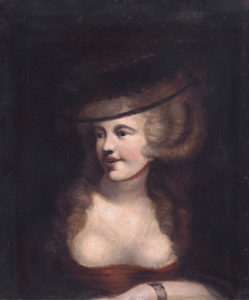 In 1788 Fuseli married Sophia Rawlins (originally one of his models), and he soon after became an associate of the Royal Academy. The early feminist Mary Wollstonecraft, whose portrait he had painted, planned a trip with him to Paris, and pursued him determinedly, but after Sophia’s intervention the Fuselis’ door was closed to her forever. Fuseli later said “I hate clever women. They are only troublesome”.
In 1788 Fuseli married Sophia Rawlins (originally one of his models), and he soon after became an associate of the Royal Academy. The early feminist Mary Wollstonecraft, whose portrait he had painted, planned a trip with him to Paris, and pursued him determinedly, but after Sophia’s intervention the Fuselis’ door was closed to her forever. Fuseli later said “I hate clever women. They are only troublesome”.
After a life of uninterrupted good health he died at the house of the Countess of Guildford on Putney Hill, at the age of 84, and was buried in the crypt of St Paul’s Cathedral.
Gallery


-

The artist moved to despair at the grandeur of antique fragments, 1778–79
-

Anna Magdalena Schweizer, 1779
-

The artist in conversation with Johann Jakob Bodmer, 1778–1781
-

The death of Achilles, 1780.
-

The two murderers of the Duke of Clarence, 1780–1782
-

Titania and Bottom, c. 1790
-

Falstaff in the laundry basket, 1792
-
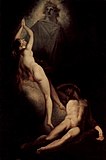
The Creation of Eve from Milton’s Paradise Lost, 1793
-

Macbeth consulting the Vision of the Armed Head, 1793
-

The daughters of Pandareus, c.1795
-

Odysseus in front of Scylla and Charybdis, 1794–1796
-

The Night-Hag visiting the Lapland Witches, 1796
-

Horseman attacked by a giant snake, c. 1800
-

Ariel, c. 1800–1810
-

Kriemhild and Gunther, 1807
-

Romeo stabs Paris at the bier of Juliet, c. 1809
-
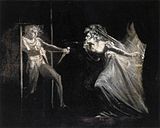
Lady Macbeth Seizing the Daggers, 1810–12
-
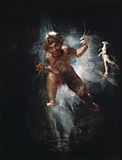
Puck, or Robin Goodfellow, c. 1810–1820
-

Fairy Mab, 1815–20
| Charles Dickens | |
|---|---|
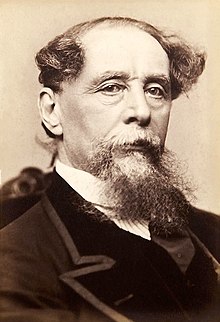
Dickens in New York, 1867
|
|
Today is the birthday of Charles John Huffam Dickens (Landport, Hampshire; 7 February 1812 – 9 June 1870 Higham, Kent); writer and social critic. He created some of the world’s best-known fictional characters and in my opinion, is the greatest novelist of the Victorian era. His works enjoyed unprecedented popularity during his lifetime, and by the twentieth century critics and scholars had recognised him as a literary genius. His novels and short stories enjoy lasting popularity.
Dickens’s literary success began with the 1836 serial publication of The Pickwick Papers. Within a few years he had become an international literary celebrity, famous for his humour, satire, and keen observation of character and society. His novels, most published in monthly or weekly instalments, pioneered the serial publication of narrative fiction, which became the dominant Victorian mode for novel publication. The instalment format allowed Dickens to evaluate his audience’s reaction, and he often modified his plot and character development based on such feedback. His plots were carefully constructed, and he often wove elements from topical events into his narratives. Masses of the illiterate poor chipped in ha’pennies to have each new monthly episode read to them, opening up and inspiring a new class of readers.
His 1843 novella, A Christmas Carol, remains popular and continues to inspire adaptations in every artistic genre. Oliver Twist and Great Expectations are also frequently adapted, and, like many of his novels, evoke images of early Victorian London. His 1859 novel, A Tale of Two Cities, set in London and Paris, is perhaps his best-known work of historical fiction. Dickens’s creative genius has been praised for its realism, comedy, prose style, unique characterisations, and social criticism. The term Dickensian is used to describe something that is reminiscent of Dickens and his writings, such as poor social conditions or comically repulsive characters.
Verse
Love is not a feeling to pass away,
Like the balmy breath of a summer day;
It is not — it cannot be — laid aside;
It is not a thing to forget or hide.
It clings to the heart, ah, woe is me!
As the ivy clings to the old oak tree.
Love is not a passion of earthly mould,
As a thirst for honour, or fame, or gold:
For when all these wishes have died away,
The deep strong love of a brighter day,
Though nourished in secret, consumes the more,
As the slow rust eats to the iron’s core.
- Lucy’s Song in The Village Coquettes (1836); later published in The Poems and Verses of Charles Dickens (1903)
A Tale of Two Cities
Book I – Recalled to Life
Chapter I – The Period
- It was the best of times, it was the worst of times, it was the age of wisdom, it was the age of foolishness, it was the epoch of belief, it was the epoch of incredulity, it was the season of Light, it was the season of Darkness, it was the spring of hope, it was the winter of despair, we had everything before us, we had nothing before us, we were all going direct to Heaven, we were all going direct the other way – in short, the period was so far like the present period, that some of its noisiest authorities insisted on its being received, for good or for evil, in the superlative degree of comparison only.
Mac Tag

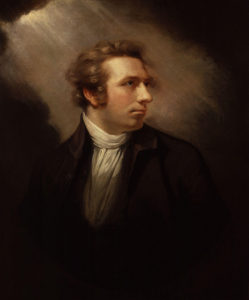
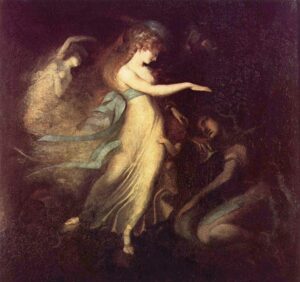
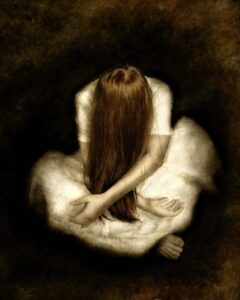
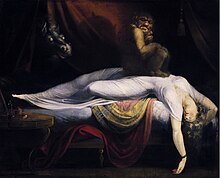
No Comments on "The Lovers’ Chronicle 7 February – thanks – art by Henry Fuseli – birth of Charles Dickens"